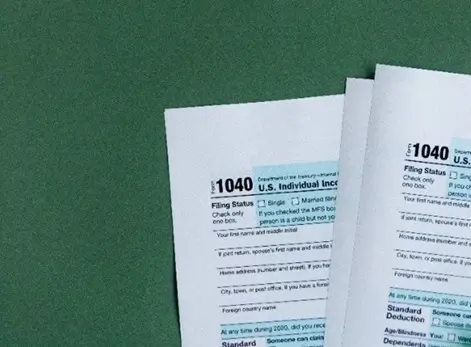
It’s a common question. You’re going to be added onto someone’s deed. Will you have to declare your new homeownership to the IRS?
An acquisition of real estate is not considered income. But being named on a deed could still implicate taxes. Let’s explore why.
What Kind of Deed?
First, when someone wants to add you to a deed, they often transfer the ownership interest by quitclaiming it. This can be as simple as conveying a deed from a sole owner into both of your names as co-owners.
Quitclaims are versatile! Here are five top reasons a homeowner uses a quitclaim.
Quitclaim deeds enable simple transfers, without title searches. They can easily transfer ownership interests to relatives or close associates.
But in some cases, quitclaims have unintended drawbacks. Unlike a warranty deed, a quitclaim doesn’t assure the recipient of free and clear title.
Also, quitclaiming might cause a loss of beneficial tax treatment later on, when the new owner goes to sell. More on this in a moment.
Why Add an Owner?
Many people, single parents especially, may think it is a good idea to add a child’s name to their home deed. They want to be sure the home goes to the named recipient after their death, to keep the home out of probate.
Here’s the rub. Being added to the deed won’t make the home probate-proof. If someone adds you to the deed, yet dies with a partial ownership interest, the title will still go into probate.
Back to the tax point, a transfer of a homeownership interest with no consideration (for free, that is) counts as a gift. So, let’s talk about…
Gifted Deeds and the IRS

Gift taxes on gifted deeds? They’re a thing. But the simple act of being named on a deed isn’t taxable. Nor will it impact most people who add someone else onto their deeds.
As H&R Block explains it:
Adding a family member to the deed as a joint owner for no consideration is considered a gift of 50% of the property’s fair market value for tax purposes.
Nevertheless, most givers pay no gift tax. This is because most will not be maxing out their lifetime gift exemption. Under this year’s tax laws, individual givers may exclude gifts worth up to $19.92 million over their lifetimes.
Still, if the value of a gift is over $17,000, the giver must inform the IRS of the gift, using Form 709.
Know the difference between a life estate deed and a gift deed. Is the person who’s giving you an ownership interest going to keep living in the house? Then the IRS is unlikely to deem the property interest a gift.
Planning Like a Pro
If you get a homeownership interest as a gift — depending on if and how long you live in the home — you could wind up paying tax on the capital gains if you sell your ownership interest. In contrast, if you can get a stepped-up cost basis, the home’s rise in value during the time the giver lived in it are tax-exempt for you. Therefore, in a state with no (or small) inheritance taxes, it could put you at a financial disadvantage to accept a home by going onto the deed now, rather than inheriting later.
Plus, there are other ways to receive a home. Have you thought about trusts, family partnerships, or LLCs? These options are available everywhere.
Wills and trusts are very common tools for passing real estate along. A simple will is the easiest path. When you receive a deed through a will, it comes certified by the local probate court. The all-important stepped-up cost basis for taxes? Inheriting is a perfect way to benefit from that.
But some people fear a will could be challenged. Sometimes, older homeowners quitclaim their paid-off homes into trusts. They might do this to let the home bypass probate after they pass away, or to keep the asset off-limits to creditors. A beneficiary of trust property will enjoy the stepped-up cost basis, too.
Check State-Specific Options
Depending on where you live, there may be another option. Your state might recognize transfer on death (“TOD” or “beneficiary deed”) forms. These forms let owners pass ownership down to a designated person.
Just as with the transfer of a financial account to a designated beneficiary, ownership shifts only when the owner dies. So, a person who signs a TOD deed can always revoke it during life, either by:
(a) Selling the home. This nullifies the TOD form.
(b) Recording a new document to remove and replace the beneficiary deed.
If you are named on a beneficiary deed, you receive ownership after the owner’s death. The only time a probate court would intervene is when a personal representative must sell the home, on account of the estate’s debts. Yet even when a TOD deed bypasses probate, people with claims can go to the probate court to challenge the transfer.
Quick Tips
Have you thought through these aspects of accepting partial ownership?
- Consider tax consequences whenever you take on an ownership interest.
- Check with the home county’s deed recording office before making a decision. Find out if transfer taxes will be required in your case.
- Use caution if there are any mortgage liens on the home. When an ownership interest changes hands, mortgage companies may accelerate a loan’s due date. So, it’s important to clear the transfer in advance with the company.
- Will the owner’s homestead tax reduction be impacted by the transfer? Find out first.
Be sure to understand the various aspects of taxation involved with a deed transfer. When in doubt, it’s OK to refuse a deed and just say “no, thanks” to the obligations of ownership.
Creating Your Quitclaim Deed
Thinking of transferring real estate? At Deeds.com we can help you create your quitclaim deed, or another deed form that fits your or your loved ones’ needs.
Note: The articles on this site are not to be considered financial or legal advice. Note, too, that they are generalized. Your real-life situation is fact-specific. Additionally, deed conveyances are impacted by the laws of the state where the real estate is. For all of these reasons, consult a local financial adviser or estate planning lawyer with your particular questions. A real estate law expert can help clients obtain a step up in cost basis using particular strategies.
Supporting References
Internal Revenue Service, via IRS.gov: Frequently Asked Questions on Gift Taxes; and Form 709 for gifts of real estate.
Deeds.com: Your Mother Wants to Add You to the House Deed. Good Idea? (Jun. 5, 2023).
Deeds.com: Using a Quitclaim Deed – What Are the Drawbacks? (Nov. 7, 2022).
Deeds.com: Should Your Child’s Name Be on Your House Deed? (Oct. 13, 2021).
Deeds.com: Adding Someone to Your Real Estate Deed? Know the Risks (Feb. 19, 2019).
H&R Block, via HRBlock.com: If You Transfer Property to a Family Member, What are the Tax Implications? (2002).
Rick Rodgers of Rodgers & Associates (Lancaster, PA): The Risks of Adding Your Child to Your Home’s Deed (Oct. 6, 2020).
And as linked.
More on topics: Transfer on death deeds versus wills, Quitclaims versus wills
Photo credits: RDNE Stock Project and Nataliya Vaitkevich, via Pexels.
